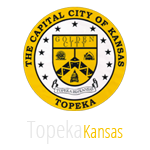The City of Topeka is proud to share that it has again been recognized for achieving 2021 What Works Cities Certification, the national standard of excellence in data-driven city governance. What Works Cities Certification evaluates how well cities are managed by measuring the extent to which city leaders incorporate data and evidence in their decision-making.
Topeka, has been certified at the silver level as part of WWC’s Certification program. What Works Cities is a national initiative launched by Bloomberg Philanthropies to help cities use data and evidence more effectively to tackle their most pressing challenges.
“I’m proud of our city for being the only city in Kansas to be What Works Cities certified,” said Mayor Michelle De La Isla. “The hard work and dedication by staff has paid off and you can see it in every aspect from the city from the quality of our streets improving to the transparency of our processes.”
What Works Cities Certification assesses cities based on their data-driven decision-making practices, such as whether they are using data to set goals and track progress, allocate funding, evaluate the effectiveness of programs, and achieve desired outcomes from contracts with outside vendors. The program also measures whether cities are publicly and transparently communicating about their use of data and evidence.
Over the past year, Topeka has demonstrated measurable progress on these foundational data practices. Some notable examples of the city’s use of data include:
- Performance Management
- Grant Applications
- Transparency
- Street improvements through Pavement Condition Index data collection
The 16 new cities that achieved Certification this year include four cities at the Gold level (Austin, TX; Chattanooga, TN; Detroit, MI; and Gilbert, AZ) and 12 cities at the Silver level: Baton Rouge, LA; Bellevue, WA; Fort Collins, CO; Glendale, AZ; Irving, TX; Little Rock, AR; Madison, WI; Minneapolis, MN; Norfolk, VA; Portland, OR; San Antonio, TX; and Syracuse, NY.
Additionally, three cities that had previously been certified advanced to the next level of Certification: Cambridge, MA (Gold); Memphis, TN (Gold); and Phoenix, AZ (Gold). Four cities renewed their Certification this year: South Bend, IN (Silver); San Jose, CA (Silver); Tempe, AZ (Gold); and Topeka, KS (Silver).
“City leaders are using data to understand and support the needs of residents like never before,” said Michele Jolin, CEO and Co-Founder of Results for America, the lead partner in the What Works Cities initiative. “Throughout the COVID crisis and a historic reckoning with racial injustice, mayors have relied on data to identify and narrow racial gaps, and to make smarter investments that increase opportunity for all their residents. These cities are testing new solutions and measuring what works, rebuilding trust in government by engaging with their residents, and using evidence and data to drive faster progress on their toughest challenges.”
Cities that have achieved Certification in previous years include: Arlington, TX (2020 Gold), Boston, MA (2020 Silver), Boulder, CO (2020 Silver), Cambridge, MA (2020 Silver), Charlotte, NC (2020 Silver), Cincinnati, OH (2020 Silver), Kansas City, MO (2020 Gold), Los Angeles, CA (2020 Platinum), Louisville, KY (2020 Platinum), Memphis, TN (2020 Silver), Mesa, AZ (2020 Silver), New Orleans, LA (2020 Silver), Philadelphia, PA (2020 Silver), Phoenix, AZ (2020 Silver), San Diego, CA (2020 Silver), San Francisco, CA (2020 Gold), San Jose, CA (2020 Silver), Scottsdale, AZ (2020 Silver), Seattle, WA (2020 Gold), South Bend, IN (2020 Silver), Topeka, KS (2020 Silver), Tulsa, OK (2020 SIlver), and Washington, DC (2020 Gold).
Jennifer Park, founding director of What Works Cities Certification, shared, “Since Certification was first introduced, cities have made tremendous progress in their ability to build the data capacity and skills needed to drive their decision-making with data and evidence. This year, cities used data and evidence to guide their response to COVID, address budget shortfalls, reimagine public safety, advance equity, and much more. Data wasn’t just a valuable tool for city leaders – it was a necessity.”
What Works Cities Certification was developed by a team of experts from Results for America in close consultation with the What Works Cities Certification Standard Committee. To evaluate cities, these experts conducted a rigorous validation process of cities’ Certification assessments and participated in site visits to the highest-performing cities to determine the city’s Certification level.
The program has inspired a movement of cities that are doubling down on their commitment to building the most well-managed local governments possible and using Certification as a roadmap for doing so. More than 200 cities have completed a Certification assessment to have their practices benchmarked against the national standard. The assessment is the first step to receiving exclusive support from What Works Cities to continue building a more effective local government. To learn more about the program and how to participate, visit https://whatworkscities.bloomberg.org/certification/.
